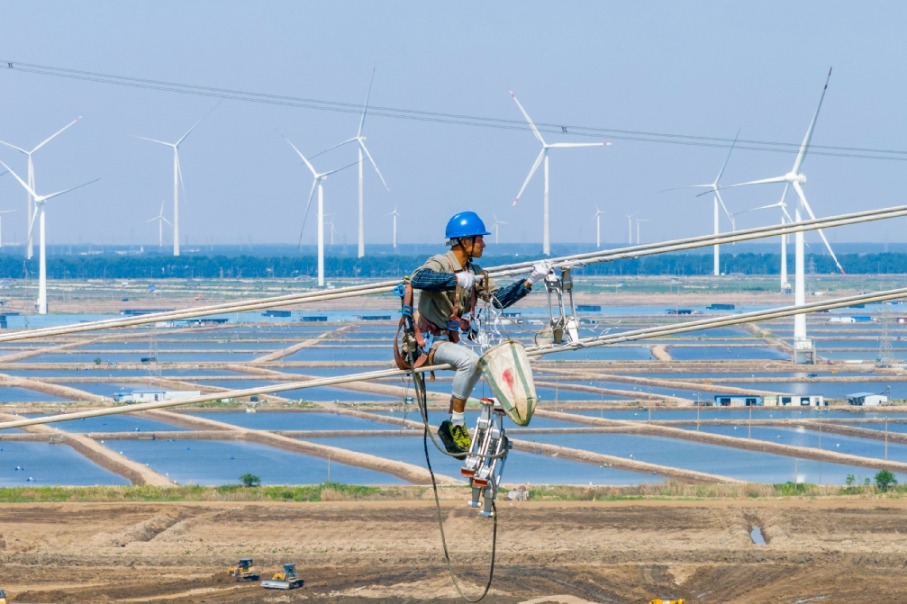China's role in the world

Nation should face up to responsibilities but also demand rest of world reciprocates.

After three decades of breakneck growth, China overtook Japan as the world's second-largest economy in 2010. The reaction in the West to China's stunning success has so far been mixed, which boils down to one question: What role will China play in the world amid its seemingly unstoppable growth?
History shows China has basically remained an inward-looking country. This tendency is most vividly expressed in the Great Wall. Despite its occasional outbursts of anger and bellicose reaction to what it regards as provocations, China harbors no ambition to become a hegemonic power. Yes, China needs to learn how to be more relaxed in global affairs. At the same time, as former US national security adviser Zbigniew Brzezinski said, Western countries should be coming to terms with China: "(A) drift into escalating reciprocal demonization" would be the worst outcome for Asia's long-term stability as well as for the China-United States relationship.
China has done more than any other economy to pull the world out of recession, and may remain an important engine of global growth for some years to come. According to the 12th Five-Year Plan (2011-2015), China will shift from export-led and investment-driven growth to a more balanced pattern of economic development. As a result, China's growth rate may be significantly lower, but more sustainable.
At the same time, the rest of the world can expect China to play a more active role in areas such as fighting climate change, poverty alleviation, global infrastructure development, and reform of the international monetary system.
The world economy has welcomed 2011 with many challenges: An uneven and unstable global recovery and the threat of protectionism and fiscal pressures, which require strong and coordinated action. China can and must play a critical role in resolving these issues.
China has already identified escalating inflation, 5.1 percent at present, as the key near-term risk. Overhanging global liquidity has led to rising input costs, but the rise in China's credit over the last two years is also to blame. Inflation is inevitable when there is abundant liquidity and strong demand. The tug of war between property developers and authorities is still on. To avoid a Japan-style boom-bust, China must stabilize housing prices, and make efforts to change the supply structure of residential units to meet people's demand for affordable housing.
Crucially, China must be willing to make short-term sacrifices, such as asset price adjustments or temporary drop in employment in certain sectors, to guarantee the long-term stability of the domestic economy. China can leverage its extremely strong fiscal position (19 percent debt to GDP ratio) to ensure that domestic demand does not suffer dramatically.
But these are tough choices. On the one hand, failure to cool down the economy would have serious consequences for China's long-term growth. On the other, a hard landing on China's part would shake the confidence in emerging markets and set back the global economy by many quarters, if not years. US attempts to blame an "undervalued" yuan for its economic woes are by and large without merit. Nevertheless, it should be recognized that a stronger yuan is not only beneficial to the US, but also in the interest of China, because Beijing needs to promote structural adjustment and contain spillover inflation.
Now a new argument for the revaluation of the yuan is gaining ground: China must choose between maintaining large current account surpluses and lower reserve accumulation, that is, have fewer dollars to plough into US government securities. Lower reserve accumulation means less central bank intervention in the foreign exchange market, which in turn means tolerating greater yuan revaluation.
Given that the developed world is unlikely to move toward policy normalization anytime soon, capital flows will probably be lopsided at a time when China is trying to rein in inflation and deflate asset bubbles. Like other emerging economies, China has to strengthen its management on cross-border capital inflows, even though some of these flows are not speculative in nature.
China's leadership has stated repeatedly that nothing will be done to destabilize the sovereign bond market. But we expect the likes of the US and the eurozone to act responsibly toward their creditors. The US is debasing its currency with QEII, while President Barack Obama's tax deal failed to address the deficit and allay the fear of its creditors. This year could see China sending a clear message to the US: Do not expect any more munificence.
The lack of alternatives to the dollar as a reserve currency has bred a sense of security within the US Treasury and the Federal Reserve. A reduction in Chinese buying (when China reduces its current account surplus and diversifies away from US dollar assets) will be felt in the US Treasuries market. Some in Washington may dismiss this as a bluff, but surely a healthier US fiscal balance is in everyone's interest. Like China, the US also needs to make more sacrifices. Of course, we have noticed that the sacrifices in the US so far are not fairly borne among Americans.
As for the eurozone, while voicing its strong support, China must urgently seek clarification on whether its current holdings of periphery debt will be part of any restructuring plan. According to market observers, the numbers for Ireland and Greece do not add up. Until such clarification is provided, or the eurozone comes up with a permanent resolution mechanism, I do not think China should commit itself to supporting the eurozone by buying government bonds directly, because there is the risk of turning good money bad.
In aggregate terms, though, the eurozone remains an attractive investment destination, with a strong institution (for now) in the form of European Central Bank and Germany's fiscal strength. China wants to see the eurozone carry out necessary reform and act in a responsible manner, but the State Administration of Foreign Exchange's primary responsibility to the Chinese people is value preservation.
There is much to be done in 2011. China should be bold and face up to the responsibilities, but it should also demand the rest of the world to reciprocate.
The author is president of the China Society of World Economics, a former member of the monetary policy committee of the People's Bank of China, and former director of the Chinese Academy of Social Sciences' Institute of World Economics and Politics.
Today's Top News
- Nepal's hydropower a climate change solution
- UN Charter still guiding compass of humankind
- Leaders pledge to strengthen Sino-Senegalese relations
- China, Ecuador to support each other's core interests
- Details on trade talks confirmed
- Bolder steps likely to boost demand






























